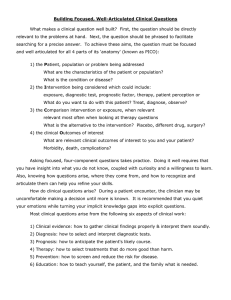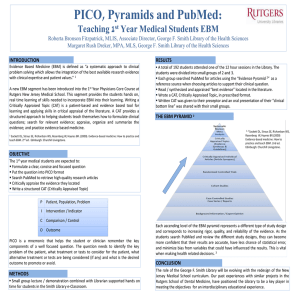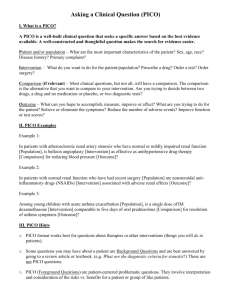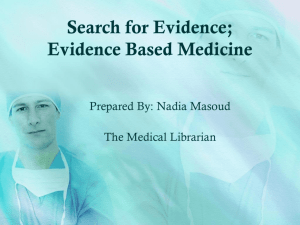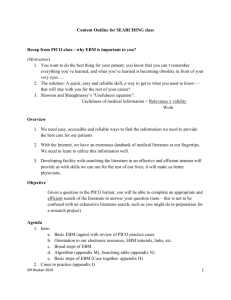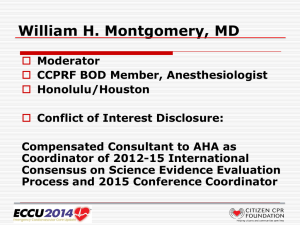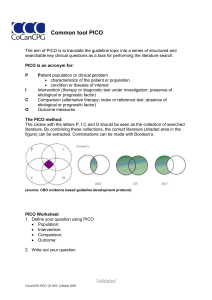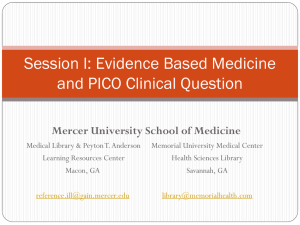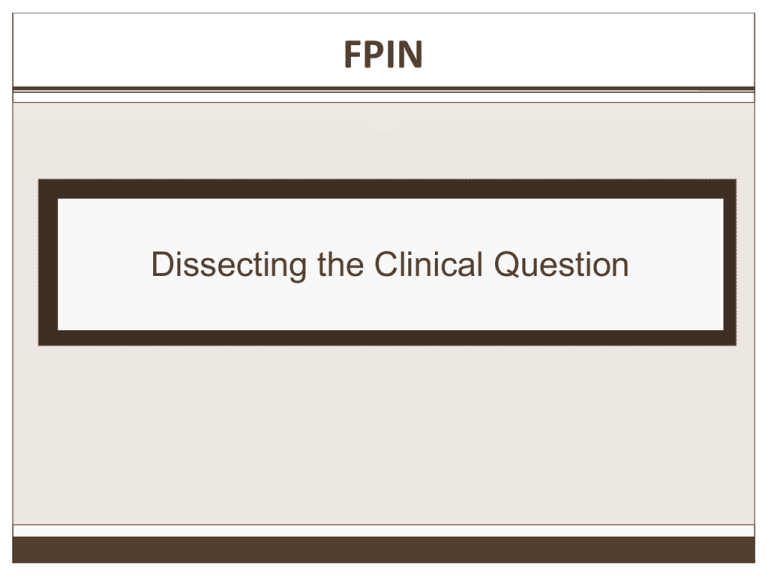
FPIN
Dissecting the Clinical Question
OVERVIEW
Types of questions
PICO for therapy questions
Practice exercises
A word about diagnostic questions
Other resources
COMMON TYPES OF CLINICAL
QUESTIONS
QUESTION TYPE
DESCRIPTION
Diagnosis:
How to select and interpret diagnostic tests.
Therapy:
How to select treatments that do more good
than harm and that are worth the efforts and
costs involved.
How to estimate the clinical course of the
condition and anticipate likely related
complications.
How to identify causes for disease (including
iatrogenic forms.)
Prognosis:
Harm/Etiology:
Prevention
Differential diagnosis / symptom prevalence
study.
Cost
Economic and decision analyses. What is the
most cost effective alternative.
DISTILL THE THERAPY QUESTIONS TO
P.I.C.O.
Key Elements
Define Search Terms
Patient /
Problem
Patient cohort, age, sex
Problem, disease, or co-existing conditions.
Intervention
Proposed drug, therapy, test, intervention etc.
Possible prognostic factor, or exposure.
Comparison
Alternative course of action/inaction?
Outcome
Goal i.e., relieve or eliminate the symptoms?
reduce the number of adverse events?
improve function or test scores?
EXAMPLE SEARCH TABLE
Key Elements
Define Search Terms
Patient /
Problem
Intervention
Atrial Fibillation, elderly,
Comparison
None, placebo
Outcome
Primary: reduce need for hospitalization
Secondary: reduce mortality
Heparin, warfarin
PICO EXAMPLE #1
Do adults with acute bronchitis who are treated
with antibiotics note earlier improvement in
clinical symptoms, compared to those who are
given inhaled albuterol?
P - Adults with acute Bronchitis
I - Antibiotics
C - Inhaled albuterol
O - Earlier improvement in clinical sx’s
PICO EXAMPLE #2
X – A CASE STUDY
Clinical Description: 34 year-old Caucasian female is
seen for routine annual well-woman exam.
•
Patient has been taking a monophasic OCP
continuously to suppress her menstrual cycle for the
last 5 months. (Was told it is “ok” by a gynecologist in
the past.)
•
Is not reporting problems related to her current OCP
use.
•
Asks whether she could continue this indefinitely?
PICO EXAMPLE #2 – CASE STUDY CONTINUED
Clinical Question: Is it safe to take continuous OCPs for
menstrual suppression?
EBM Question: In premenopausal women using
combined OCPs does continuous cycling increase the risk of
long-term complications compared to traditional OCP cycling?
P
- Premenopausal women using combined OCPs
I
- Continuous cycling
C - Traditional OCP cycling or placebo
O - Long term safety (endometrial or ovarian ca, breast
cancer, cardiovascular, bone, fertility, etc.)
PICO EXAMPLE
– A CASE
PICO E#2
XAMPLE
#3 STUDY
Clinical Question: Should I use a statin in a diabetic with
LDL < 100?
EBM Question: Do statins, as primary prevention, improve
mortality/morbidity in DM pts w/ LDL already <100 compared to no
Rx? (therapy, prevention)?
P - Patient population or problem
Diabetics (w/o h/o CV events) w/ LDL <100
I - Intervention
Statin
C - Control or comparative intervention
Placebo or no tx
O - Outcome
Stroke, MI, ESRD, etc.
GROUP EXERCISE
PICO - #4
1B ANSWER
PICO EXAMPLE
EBM Question: In adults with minor depression, is St
John’s wort or an SSRI more effective at relieving
symptoms?
P
I
C
O
-
Adults with minor depression
St. John’s wort
An SSRI
Relief of depression symptoms
GROUP EXERCISE PICO - 1C SMOKER
PICOCOUGH
EXAMPLE #5
EBM Question: In smokers with cough, does chest
x-ray or chest CT have a better positive or negative
predictive value for lung cancer?
P I CO-
Adult smokers with cough
Chest x-ray
Chest CT
Positive and negative predictive value for
lung cancer
DISSECTING DIAGNOSTIC
QUESTIONS
What is the condition (disease) of interest.
What is the test of interest
What is the comparison test (gold standard) of
interest
What do out want to know about the test, e.g. the
test related "outcome."
EBM QUESTION: RESOURCES
The Well Built Question - University of North Carolina and Duke
University
http://www.hsl.unc.edu/Services/Tutorials/EBM/Question.htm
Sackett, D. Evidence-based Medicine - What it is and
what it isn't. http://www.cebm.net/ebm_is_isnt.asp
University of Oxford Center of Evidence-based Medicine
Lecture on Formulating a question:
http://www.youtube.com/watch?v=DadRleW_pE4
NEXT STEPS
If you would like more practice go to the Center for EBM
Toronto and Practice Formulating Questions:
http://ktclearinghouse.ca/cebm/practise/formulate
Submit your question using the question submission
form.

